一般疑问句PPT课件
合集下载
小学英语语法---一般疑问句和特殊疑问句ppt课件
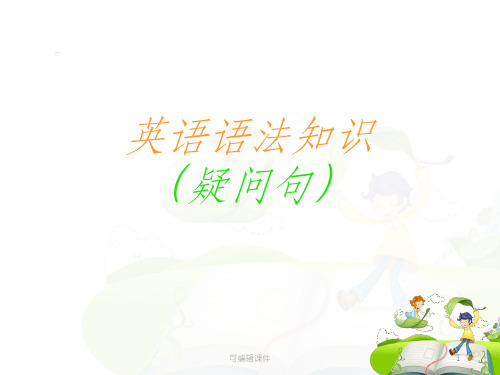
可编辑课件
4
e.g
This is Amy's bike.(一般疑问句)
Is this Amy's bike?
Yes, this is. (肯定回答)错误
No, this isn‘t. (否定回答)错误
Did you go to Beijing last weekend?
Yes, I did. (肯定回答)
2、如句子里是动词就在这些词前加 don't,doesn't,didn't
(1)主语是第一、二人称(复数)加don’t,第三人称单数加
doesn't
(2)如果是过去式就加didn't
例:I like dogs.
She likes swimming.
I don‘t like dogs.
She doesn’t like swimming.
No, I didn't. (否定回答)
I have some books. (一般疑问句)
Do you have any b可o编辑o课件ks?
5
变否定句的做法:
1、如句子里是be动词:am,is,are,was,were 就在这些词后加 not
例: He is Tom.
He is not Tom.
( B) 25. ______ tea did you have?
Two cups. • How many B. How much C. How soon D. Which
可编辑课件
15
感谢亲观看此幻灯片,此课件部分内容来源于网络, 如有侵权请及时联系我们删除,谢谢配合!
感 谢 阅
读感
谢
PEP小学英语六年级下册期末复习_一般疑问句》课件
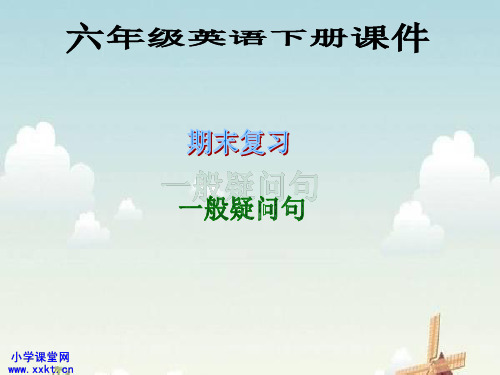
一般疑问句练习题 陈述句变一般疑问句 1. His father is an English teacher. _________________________________________ ? 2. These cats are crying.(喊叫) _________________________________________ ? 3. They can swim. _________________________________________ ? 4. I like to read(阅读) English. _________________________________________ ? 5. I go to school on foot.(走路) _________________________________________ ? 6. He likes English. _________________________________________ ? 7. His father goes to work by bus.(乘公共汽车) _________________________________________ ? 8. He is crying(哭) under the tree. _________________________________________ ? 9. His birthday is on the twentieth of November. _________________________________________ ? 10. Mrs. Li and Kitty are in a big shop. _________________________________________ ? 11. Kitty is wearing her new uniform. _________________________________________ ? 12. The boy under the tree(树) is hungry.(饥饿) _________________________________________ ? 13. He goes to school every day. _________________________________________ ? 14. I want to have a model car(摩托车). _________________________________________ ?
英语六年级一般疑问句课件ppt
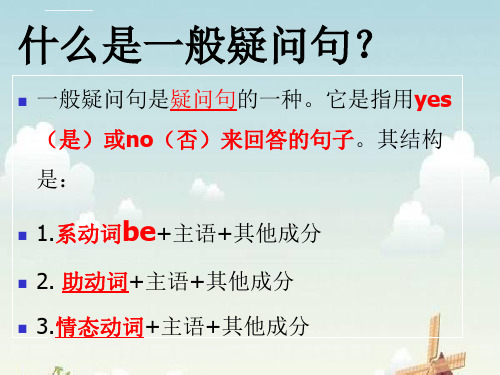
2. 助动词+主语+其他成分 3.情态动词+主语+其他成分
从 使 用 情 况 来看, 闭胸式 的使用 比较广 泛。敞 开式盾 构之中 有挤压 式盾构 、全部 敞开式 盾构, 但在近 些年的 城市地 下工程 施工中 已很少 使用, 在此不 再说明 。
1.含系动词be的句子
系动词 be有am 、is、are
1. His father is an English teacher. _______________________________ ? 2. These cats are crying.(喊叫) _______________________________? 3. They can swim. _______________________________ ? 4. I like to read English. _______________________________ ? 5. I go to school on foot. _______________________________ ? 6. He likes playing football. _______________________________ ? 7. His father will go to the park by bus.
从 使 用 情 况 来看, 闭胸式 的使用 比较广 泛。敞 开式盾 构之中 有挤压 式盾构 、全部 敞开式 盾构, 但在近 些年的 城市地 下工程 施工中 已很少 使用, 在此不 再说明 。
什么是一般疑问句?
一般疑问句是疑问句的一种。它是指用yes (是)或no(否)来回答的句子。其结构 是:
1.系动词be+主语+其他成分
从 使 用 情 况 来看, 闭胸式 的使用 比较广 泛。敞 开式盾 构之中 有挤压 式盾构 、全部 敞开式 盾构, 但在近 些年的 城市地 下工程 施工中 已很少 使用, 在此不 再说明 。
1.含系动词be的句子
系动词 be有am 、is、are
1. His father is an English teacher. _______________________________ ? 2. These cats are crying.(喊叫) _______________________________? 3. They can swim. _______________________________ ? 4. I like to read English. _______________________________ ? 5. I go to school on foot. _______________________________ ? 6. He likes playing football. _______________________________ ? 7. His father will go to the park by bus.
从 使 用 情 况 来看, 闭胸式 的使用 比较广 泛。敞 开式盾 构之中 有挤压 式盾构 、全部 敞开式 盾构, 但在近 些年的 城市地 下工程 施工中 已很少 使用, 在此不 再说明 。
什么是一般疑问句?
一般疑问句是疑问句的一种。它是指用yes (是)或no(否)来回答的句子。其结构 是:
1.系动词be+主语+其他成分
初中英语-疑问句(一般疑问句、特殊疑问句) PPT课件 图文
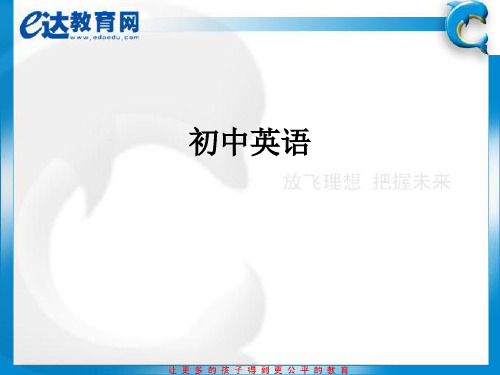
• 1.We are going to Hainan Island. Where are you going?
• 2.Chinese New Year this year is in February. When is Chinese New Year?
• 3.Kitty is wearing a special costume. Who is wearing a special costume?
which----Thing or person (对特定的人或事物提问)。
e.g “Which man is your English teacher?” “哪位是你的英 语老师?” “The man in white.” “那个穿着白衣服的。”
who----Person (对人提问)
e.g “Who will visit you tomorrow?” “My father.” “明天谁来看你?” “我爸爸。”
1.She is a pupil. Is she a pupil?
2. 她 是 学生。 是 她 学生 ?
2. I can see a star. Can you see a star?
3. My mother is a teacher.
Is your mother a teacher? 4. It will rain this afternoon.
flowers for your teachers?
Susan: No, I didn’t buy __a_n_y_ flowers, but I bought _so__m_e__ cards. Look!
Tom: Wow, how beautiful they are. Where did you buy them?
• 2.Chinese New Year this year is in February. When is Chinese New Year?
• 3.Kitty is wearing a special costume. Who is wearing a special costume?
which----Thing or person (对特定的人或事物提问)。
e.g “Which man is your English teacher?” “哪位是你的英 语老师?” “The man in white.” “那个穿着白衣服的。”
who----Person (对人提问)
e.g “Who will visit you tomorrow?” “My father.” “明天谁来看你?” “我爸爸。”
1.She is a pupil. Is she a pupil?
2. 她 是 学生。 是 她 学生 ?
2. I can see a star. Can you see a star?
3. My mother is a teacher.
Is your mother a teacher? 4. It will rain this afternoon.
flowers for your teachers?
Susan: No, I didn’t buy __a_n_y_ flowers, but I bought _so__m_e__ cards. Look!
Tom: Wow, how beautiful they are. Where did you buy them?
一般疑问句PPT

疑问句的主要功能是向对方询问信息, 并期望得到对方的回答或确认。
疑问句的分类
一般疑问句
以疑问词开头,结尾用问号,通常用于询问 事实或信息,需要对方作出肯定或否定回答 。
选择疑问句
提出两个或多个选项供对方选择,通常以“or”连 接。
特殊疑问句
以疑问词开头,结尾用问号,通常用于询问 特定的人、事、物等,需要对方提供具体的 信息。
询问信息
询问事实
一般疑问句常用于询问事实或信 息,例如“你来自哪个国家?” 或“明天天气怎么样?”。
寻求建议
在寻求建议或帮助时,一般疑问 句也经常被使用,例如“我应该 穿什么衣服?”或“我应该怎么 做?”。
了解情况
在了解某个情况或状况时,一般 疑问句也是常用的表达方式,例 如“这个电影什么时候上映?” 或“这个地方怎么去?”。
一般疑问句
目录
CONTENTS
• 一般疑问句的定义 • 一般疑问句的构成 • 一般疑问句的回答 • 一般疑问句的用法 • 一般疑问句的注意事项
01 一般疑问句的定义
什么是疑问句
疑问句是一种句式,用于提出疑问或 询问信息,通常以疑问词(如 “what”、“where”、“when” 、“how”等)开头。
请求确认
确认信息
当我们需要确认对方是否拥有某些信息时, 一般疑问句可以用来请求确认,例如“你确 定这是正确的答案吗?”或“你记得那个人 的名字吗?”。
确认事实
当我们想要确认某个事实是否正确时,一般 疑问句也可以用来请求对方确认,例如“你 确定明天是星期五吗?”或“你记得我上次 是什么时候来的吗?”。
要点二
避免使用否定疑问词
在一般疑问句中,应避免使用否定疑问词,因为这可能会 引起歧义或误解。
疑问句的分类
一般疑问句
以疑问词开头,结尾用问号,通常用于询问 事实或信息,需要对方作出肯定或否定回答 。
选择疑问句
提出两个或多个选项供对方选择,通常以“or”连 接。
特殊疑问句
以疑问词开头,结尾用问号,通常用于询问 特定的人、事、物等,需要对方提供具体的 信息。
询问信息
询问事实
一般疑问句常用于询问事实或信 息,例如“你来自哪个国家?” 或“明天天气怎么样?”。
寻求建议
在寻求建议或帮助时,一般疑问 句也经常被使用,例如“我应该 穿什么衣服?”或“我应该怎么 做?”。
了解情况
在了解某个情况或状况时,一般 疑问句也是常用的表达方式,例 如“这个电影什么时候上映?” 或“这个地方怎么去?”。
一般疑问句
目录
CONTENTS
• 一般疑问句的定义 • 一般疑问句的构成 • 一般疑问句的回答 • 一般疑问句的用法 • 一般疑问句的注意事项
01 一般疑问句的定义
什么是疑问句
疑问句是一种句式,用于提出疑问或 询问信息,通常以疑问词(如 “what”、“where”、“when” 、“how”等)开头。
请求确认
确认信息
当我们需要确认对方是否拥有某些信息时, 一般疑问句可以用来请求确认,例如“你确 定这是正确的答案吗?”或“你记得那个人 的名字吗?”。
确认事实
当我们想要确认某个事实是否正确时,一般 疑问句也可以用来请求对方确认,例如“你 确定明天是星期五吗?”或“你记得我上次 是什么时候来的吗?”。
要点二
避免使用否定疑问词
在一般疑问句中,应避免使用否定疑问词,因为这可能会 引起歧义或误解。
一般疑问句复习课件
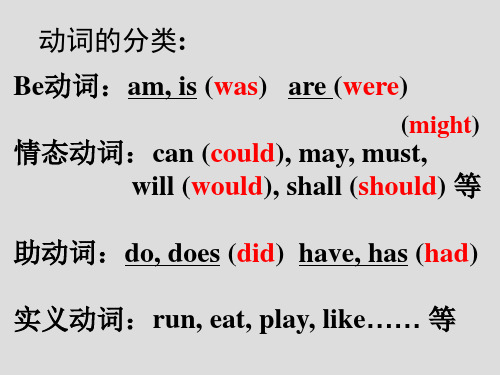
____________a_r_e_n_’_t____ . 3. There is a bookstore near the hospital.
3.These are my parents.
Are these your parents? Yes, they are./No,they aren’t.
4.It is a pencil case.
Is it a pencil case? Yes, it is./No,it isn’t.
5.He is my friend.
----No, they _a_r_e_n_’_t_.
18.What ___is___ this in English? ---- It __is___ a watch.
19 What color ___i_s_ the bookcase?
---- It ___i_s__ red. 20.What ___a_re___ these?
1.This is my friend. 2. There are some books on the teacher’s desk. 3. They can swim. 4. These story-books are mine. 5. He goes to school on foot. 6. Mrs. Li and Kitty were here just now. 7. There was a building here last year. 8. I will look after my sister this Sunday. 9. Tom did his homework last night. 10.I have ever been to France. 11. Mike has gone to Beijing.
3.These are my parents.
Are these your parents? Yes, they are./No,they aren’t.
4.It is a pencil case.
Is it a pencil case? Yes, it is./No,it isn’t.
5.He is my friend.
----No, they _a_r_e_n_’_t_.
18.What ___is___ this in English? ---- It __is___ a watch.
19 What color ___i_s_ the bookcase?
---- It ___i_s__ red. 20.What ___a_re___ these?
1.This is my friend. 2. There are some books on the teacher’s desk. 3. They can swim. 4. These story-books are mine. 5. He goes to school on foot. 6. Mrs. Li and Kitty were here just now. 7. There was a building here last year. 8. I will look after my sister this Sunday. 9. Tom did his homework last night. 10.I have ever been to France. 11. Mike has gone to Beijing.
一般疑问句ppt课件

变化,对应的单词做变化。 三问号: 指把结尾的句号变成问号
.
注意: 1.遇 I(我)/we(我们)—you(你/你们)
Eg:陈述句:We are happy. 一般疑问句:Are you happy?
2.my(我的)—your(你的) Eg:陈述句:I am going to visit my grandparents this Sunday. 一般疑问句:Are you going to visit your grandparents this Sunday?
.
陈述句变一般疑问句:2.句子中有情态动词(can) 的,把情态动词提到句首。
一提、二变、三问号
Can Tthheeyycan play football ?.
.
Exercises2
1. I can skate . 2. _C_a_n____y_o_u___skate?
2.She can sweep the floor. __C__a_n__ _s_h_e__sweep the floor?
? Is Hhe is a student . 一提、二变、三问号
? Are Tthheeyy are teachers .
一提、二变、三问号
Are Tthheerree areasnoyme apples on the desk.?
.
Exercises1
1) I am from China. __A_r_e_ ___y_o_u__ from China?
.
一般疑问句做肯定,否定回答
Are you a student?
肯定回答:Yes , I am. 否定回答:No, I’m not.
肯定回答: Yes , 主+be动词/can/助.
.
注意: 1.遇 I(我)/we(我们)—you(你/你们)
Eg:陈述句:We are happy. 一般疑问句:Are you happy?
2.my(我的)—your(你的) Eg:陈述句:I am going to visit my grandparents this Sunday. 一般疑问句:Are you going to visit your grandparents this Sunday?
.
陈述句变一般疑问句:2.句子中有情态动词(can) 的,把情态动词提到句首。
一提、二变、三问号
Can Tthheeyycan play football ?.
.
Exercises2
1. I can skate . 2. _C_a_n____y_o_u___skate?
2.She can sweep the floor. __C__a_n__ _s_h_e__sweep the floor?
? Is Hhe is a student . 一提、二变、三问号
? Are Tthheeyy are teachers .
一提、二变、三问号
Are Tthheerree areasnoyme apples on the desk.?
.
Exercises1
1) I am from China. __A_r_e_ ___y_o_u__ from China?
.
一般疑问句做肯定,否定回答
Are you a student?
肯定回答:Yes , I am. 否定回答:No, I’m not.
肯定回答: Yes , 主+be动词/can/助.
《一般疑问句》课件
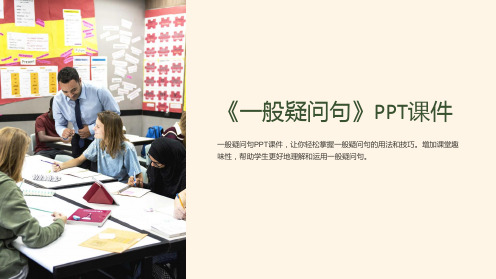
总结
• 一般疑问句用于向他人提问,通过主谓倒装和Yes/No回答。 • 特殊疑问句以特殊疑问词开头,用于询问特定信息。 • 通过练习掌握一般疑问句、Yes/No问答和特殊疑问句的使用。 • 巩固并应用一般疑问句,提高沟通表达能力。
《一般疑问句》PPT课件
一般疑问句PPT课件,让你轻松掌握一般疑问句的用法和技巧。增加课堂趣 味性,帮助学生更好地理解和运用一般疑问句。
什么是一般疑问句?
1 定义
2 重要性
一般疑问句是用于向对方提问的句型,通 过倒装询问陈述句的真实性或肯定/否定的 回答。
学习一般疑问句有助于提高语言表达能力, 使对话更加生动有趣。
一般疑问句的句型结构
1
基本句型
一般疑问句的基本句型是:助动词 +
主谓倒装
2
主语 + 谓语。
当主语为第三人称单数,或以非be动
词开头时,需要将主语和谓语进行倒
ห้องสมุดไป่ตู้装。
3
示例
一般疑问句的示例:Are you ready? Can he swim? Did they finish the project?
Yes/No问答
1 回答方式
Yes/No问答是对一般疑问句进行肯定或否定回答,可以直接简略回答或使用完整句子回 答。
2 缩略回答
缩略回答只使用动词和be动词“是”或“不是”的形式,如“Yes, I am.” 或“No, he isn't.”
特殊疑问句
1 定义
特殊疑问句是用于询问特定信息的句型,常以特殊疑问词开头。
2 句型结构
特殊疑问句的句型结构是:特殊疑问词 + 助动词(be动词) + 主语 + 谓语(其它动词)。
- 1、下载文档前请自行甄别文档内容的完整性,平台不提供额外的编辑、内容补充、找答案等附加服务。
- 2、"仅部分预览"的文档,不可在线预览部分如存在完整性等问题,可反馈申请退款(可完整预览的文档不适用该条件!)。
- 3、如文档侵犯您的权益,请联系客服反馈,我们会尽快为您处理(人工客服工作时间:9:00-18:30)。
3.John can cook the meals. ___C_a_n__ _J_o_h_n__ cook the meals?
4.The dog can swim. __C_a_n__ __t_h_e_ __d_o_g__swim?
陈述句变一般疑问句:3.句子中动词是实义动词
(动作的动词 )的句子,在句首前面加助动词
陈述句变一般疑问句:2.句子中有情态பைடு நூலகம்词(can) 的,把情态动词提到句首。
一提、二变、三问号
Can Tthheeyycan play football ?.
Exercises2
1. I can skate . __C__a_n__ _y_o_u__skate?
2.She can sweep the floor. __C__a_n__ _s_h_e__sweep the floor?
3. Amy and Sarah go to the park by bus. __D_o___ __t_h_e_y__ go to the park by bus?
4. We watch TV together. __D_o___ _y_o_u__ watch TV together?
陈述句变一般疑问句:3.句子中动词是实义动词
2) They are blue. __A_r_e_ _t_h_e_y_blue?
3) He is ZhangPeng. ___Is__ __h_e___ ZhangPeng?
4)Mike is a student . __I_s___ _M_i_k_e_\h_e a student?
5)There are some pictures on the wall. __A__re___ t_h_e_r_e__ ___a_n_y__ pictures on the wall?
一般疑问句
什么是一般疑问句?
• 一般疑问句是疑问句的一种。它是指用Yes (是)或No(否)来回答的句子.
1.be动词(am,is,are)+主语+其他成分 2.情态动词(can)+主语+其他成分 3.助动词(do,does)+主语+其他成分
变句式按照步骤分一二三步 一提:指把be动词(am,is,are) 、情态 动词(can)提到主语的前面 一加:指加上助动词(do,does) 二变:指把相关的大小写做合理的
肯:Yes, it is . 否:No,it isn’t.
5) Is that a desk?
一般疑问句做肯定,否定回答
Are you a student?
肯定回答:Yes , I am. 否定回答:No, I’m not.
肯定回答: Yes , 主+be动词/can/助.
否定回答: No, 主+ be动词/can/助+not.
1) Is Amy from the U.S.A?
肯:Yes, she is. 否:No, she isn’t.
? Is Hhe is a student . 一提、二变、三问号
? Are Tthheeyy are teachers .
一提、二变、三问号
Are Tthheerree areasnoyme apples on the desk.?
Exercises1
1) I am from China. __A_r_e_ ___y_o_u__ from China?
do或does
1)动词为原形,在句首加do。
一加、 二变、三问号
Do Tthheeyy get up early ?.
Exercises 3.1
1. I have a book . __D__o__ _y_o_u___ have a book?
2. They like Chinese . __D__o__ __th_e_y___ like Chinese?
变化,对应的单词做变化。 三问号: 指把结尾的句号变成问号
注意: 1.遇 I(我)/we(我们)—you(你/你们)
Eg:陈述句:We are happy. 一般疑问句:Are you happy?
2.my(我的)—your(你的) Eg:陈述句:I am going to visit my grandparents this Sunday. 一般疑问句:Are you going to visit your grandparents this Sunday?
3.some(一些)、many (许多)—any(一些) Eg:陈述句:There are many rivers in the village . 一般疑问句:Are there any river in the village?
陈述句变一般疑问句:1.句子中有be,把be 提到句首
一提、二变、三问号
1) She has a small mouth. _D_o_e_s_ she _h_a_ve__ a small mouth?
2) Mike likes China. _D_o_e_s_Mike _l_ik_e_ China?
3) Zheng Peng comes from the U.S.A. _D__o_es_ ZhangPeng _c_o_m_e_ from the U.S.A? 4) He goes shoping with his mom. _D_o_e_s_ he __g_o__ shoping with his mom?
2) Does ZhangPeng come from China?
肯:Yes, he does. 否:No, he doesn’t.
3) Do Amy and Sarah like China?
肯:Yes, they do. 否:No, they don’t.
4) Is this a ruler?
(动作的动词 )的句子,在句首前面加助动词
do或does
2)主语为第三人称单数,在句首加Does,动词用原形。
Does
一加、 二变、三问号
Hhee likes bananas
.?
一加、 二变 三问号
Does Sshhee ggooes to school on foot.?
Exercises 3.2
4.The dog can swim. __C_a_n__ __t_h_e_ __d_o_g__swim?
陈述句变一般疑问句:3.句子中动词是实义动词
(动作的动词 )的句子,在句首前面加助动词
陈述句变一般疑问句:2.句子中有情态பைடு நூலகம்词(can) 的,把情态动词提到句首。
一提、二变、三问号
Can Tthheeyycan play football ?.
Exercises2
1. I can skate . __C__a_n__ _y_o_u__skate?
2.She can sweep the floor. __C__a_n__ _s_h_e__sweep the floor?
3. Amy and Sarah go to the park by bus. __D_o___ __t_h_e_y__ go to the park by bus?
4. We watch TV together. __D_o___ _y_o_u__ watch TV together?
陈述句变一般疑问句:3.句子中动词是实义动词
2) They are blue. __A_r_e_ _t_h_e_y_blue?
3) He is ZhangPeng. ___Is__ __h_e___ ZhangPeng?
4)Mike is a student . __I_s___ _M_i_k_e_\h_e a student?
5)There are some pictures on the wall. __A__re___ t_h_e_r_e__ ___a_n_y__ pictures on the wall?
一般疑问句
什么是一般疑问句?
• 一般疑问句是疑问句的一种。它是指用Yes (是)或No(否)来回答的句子.
1.be动词(am,is,are)+主语+其他成分 2.情态动词(can)+主语+其他成分 3.助动词(do,does)+主语+其他成分
变句式按照步骤分一二三步 一提:指把be动词(am,is,are) 、情态 动词(can)提到主语的前面 一加:指加上助动词(do,does) 二变:指把相关的大小写做合理的
肯:Yes, it is . 否:No,it isn’t.
5) Is that a desk?
一般疑问句做肯定,否定回答
Are you a student?
肯定回答:Yes , I am. 否定回答:No, I’m not.
肯定回答: Yes , 主+be动词/can/助.
否定回答: No, 主+ be动词/can/助+not.
1) Is Amy from the U.S.A?
肯:Yes, she is. 否:No, she isn’t.
? Is Hhe is a student . 一提、二变、三问号
? Are Tthheeyy are teachers .
一提、二变、三问号
Are Tthheerree areasnoyme apples on the desk.?
Exercises1
1) I am from China. __A_r_e_ ___y_o_u__ from China?
do或does
1)动词为原形,在句首加do。
一加、 二变、三问号
Do Tthheeyy get up early ?.
Exercises 3.1
1. I have a book . __D__o__ _y_o_u___ have a book?
2. They like Chinese . __D__o__ __th_e_y___ like Chinese?
变化,对应的单词做变化。 三问号: 指把结尾的句号变成问号
注意: 1.遇 I(我)/we(我们)—you(你/你们)
Eg:陈述句:We are happy. 一般疑问句:Are you happy?
2.my(我的)—your(你的) Eg:陈述句:I am going to visit my grandparents this Sunday. 一般疑问句:Are you going to visit your grandparents this Sunday?
3.some(一些)、many (许多)—any(一些) Eg:陈述句:There are many rivers in the village . 一般疑问句:Are there any river in the village?
陈述句变一般疑问句:1.句子中有be,把be 提到句首
一提、二变、三问号
1) She has a small mouth. _D_o_e_s_ she _h_a_ve__ a small mouth?
2) Mike likes China. _D_o_e_s_Mike _l_ik_e_ China?
3) Zheng Peng comes from the U.S.A. _D__o_es_ ZhangPeng _c_o_m_e_ from the U.S.A? 4) He goes shoping with his mom. _D_o_e_s_ he __g_o__ shoping with his mom?
2) Does ZhangPeng come from China?
肯:Yes, he does. 否:No, he doesn’t.
3) Do Amy and Sarah like China?
肯:Yes, they do. 否:No, they don’t.
4) Is this a ruler?
(动作的动词 )的句子,在句首前面加助动词
do或does
2)主语为第三人称单数,在句首加Does,动词用原形。
Does
一加、 二变、三问号
Hhee likes bananas
.?
一加、 二变 三问号
Does Sshhee ggooes to school on foot.?
Exercises 3.2
